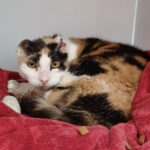 When you are a feral cat, you rely on yourself.
When you are a feral cat, you rely on yourself.
You walk the Earth with strength and dignity.
Yet the day may come when you cease to walk alone. Just ask Pisa.
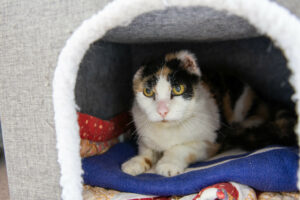 A dainty calico looks out of place outdoors. She is made for a Renoir painting or a lap, not tall grasses and creek beds. But there she was, like the Sistine Chapel next to Shop-Rite, or a ravioli in a mud puddle.
A dainty calico looks out of place outdoors. She is made for a Renoir painting or a lap, not tall grasses and creek beds. But there she was, like the Sistine Chapel next to Shop-Rite, or a ravioli in a mud puddle.
One should never underestimate a calico cat, but our species tends to underestimate everybody.
Pisa’s beauty did not make her brittle. She was no gauzy painting, no porcelain figurine tottering on a pedestal. Pisa was as real as life, and she had found a way to survive alone. She learned where to find food. She kept herself clean.
She kept to herself.
It is a risky thing to lean on someone else, so Pisa assumed she was everyone she needed, a one-cat wonder of the world.
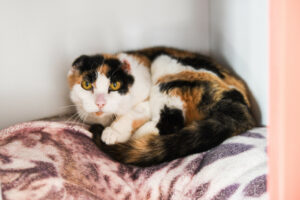 But it turns out cats can err on the side of underestimating, too.
But it turns out cats can err on the side of underestimating, too.
When you have never had to test the theory, you may assume that no one on Earth can bear your weight. Pisa is a small-to-average cat, but she was not about to rest on uncertain scaffolding like human kindness. She maintained proper posture and safe distance. She retained her walls, tall as heaven.
An angel got through anyway.
Pisa’s angel — let us call her “Speranza,” Italian for “hope” — did not ask Pisa to plop into her lap. She did not ask Pisa to trade her wildness for mercy. Speranza did not ask anything of Pisa, except permission to feed her, watch over her, and adore her.
Pisa had never leaned on another living creature. But when hope looks you in the eyes, sees you as you are, and loves you, you feel your shoulders relax. Your breath slows down from the old familiar pace of panic. And whether or not you approved of it, your life leans — just a little — into another.
Leaning just might save your life.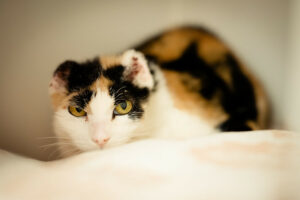
Pisa thrived in Speranza’s care. But then, little earthquakes shook Pisa’s foundations. There were troubling spots on her perfect nose. There were infections and waves of weakness.
Pisa tested positive for feline leukemia virus (FeLV), that mysterious disease that slams doors shut. Pisa’s perfect ear developed the signs of squamous cell carcinoma, the same cancer that took Tabby.
The cat who stood tall needed someone to lean on — now.
Hope does not crumble when the heavy hour comes. Speranza spoke to other angels.
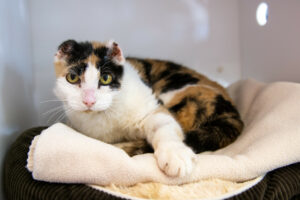 And in the mysterious orchestra of staff and seraphs, volunteers and Valkyries, calicos and “coincidences,” Pisa came to Tabby’s Place. Suddenly, the lovely loner was the queen of Quinn’s Corner.
And in the mysterious orchestra of staff and seraphs, volunteers and Valkyries, calicos and “coincidences,” Pisa came to Tabby’s Place. Suddenly, the lovely loner was the queen of Quinn’s Corner.
Pisa would be safe, without having to sign over her strength or dignity.
Pisa would lose her pinnae, the ear flaps afflicted with cancer, but life would begin again.
Pisa would have to learn to lean, but she would be in good company with you, me, and every honest creature.
Class is always in session at Tabby’s Place.
We all underestimate love, overestimate our own strength, stomp each other’s toes, and fall on our faces or our knees, depending on the day. We all forget that we need each other and try to walk alone. The cats learn faster than we do.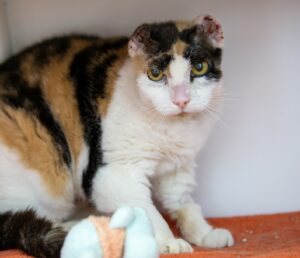
As brilliant as she is beautiful, Pisa is ahead of us all. It once felt safe to trust no one, but the fortress has imploded. Today, Pisa is a leaning tower, lovely as real life.
She needs us to feed her, to heal her, and to remind her that she is the biggest kind of beautiful.
She will live because she leaned.
Never underestimate a feral, no matter the species.

She will live because she is loved! And she is brilliantly beautiful